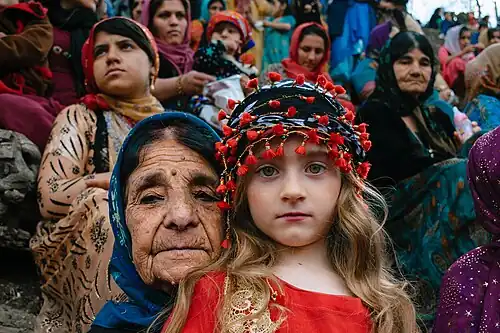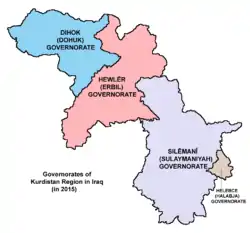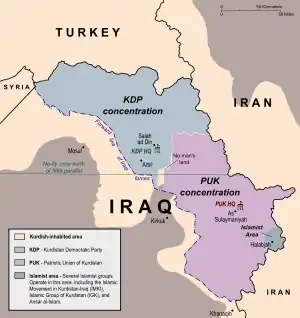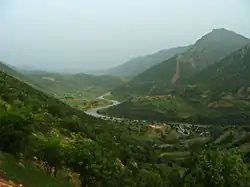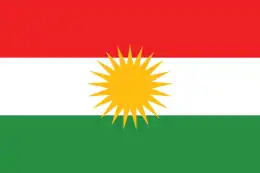The Kurdistan PortalKurdistan (Kurdish: کوردستان, romanized: Kurdistan, lit. 'land of the Kurds'; [ˌkʊɾdɪˈstɑːn] ⓘ), or Greater Kurdistan, is a roughly defined geo-cultural region in West Asia wherein the Kurds form a prominent majority population and the Kurdish culture, languages, and national identity have historically been based. Geographically, Kurdistan roughly encompasses the northwestern Zagros and the eastern Taurus mountain ranges. Kurdistan generally comprises the following four regions: southeastern Turkey (Northern Kurdistan), northern Iraq (Southern Kurdistan), northwestern Iran (Eastern Kurdistan), and northern Syria (Western Kurdistan). Some definitions also include parts of southern Transcaucasia. Certain Kurdish nationalist organizations seek to create an independent nation state consisting of some or all of these areas with a Kurdish majority, while others campaign for greater autonomy within the existing national boundaries. Though, the delineation of the region remains disputed and varied, with some maps greatly exaggerating its boundaries. Historically, the word "Kurdistan" is first attested in 11th century Seljuk chronicles. Many disparate Kurdish dynasties, emirates, principalities, and chiefdoms were established from the 8th to 19th centuries. Administratively, the 20th century saw the establishment of the short-lived areas of the Kurdish state (1918–1919), Kingdom of Kurdistan (1921–1924), Kurdistansky Uyezd i.e. "Red Kurdistan" (1923–1929), Republic of Ararat (1927–1930), and Republic of Mahabad (1946). Iraqi Kurdistan first gained autonomous status in a 1970 agreement with the Iraqi government, and its status was re-confirmed as the autonomous Kurdistan Region within the federal Iraqi republic in 2005. There is also a Kurdistan Province in Iran, but it is not self-ruled. Kurds fighting in the Syrian Civil War were able to take control of large sections of northern Syria and establish self-governing regions in an Autonomous Administration of North and East Syria (commonly called Rojava), where they seek autonomy in a federal Syria after the war. (Full article...) Selected article -
The Uprising of Sheikh Ubeydullah refers to a Kurdish uprising against the Ottoman Empire in 1879 and Qajar Iran between 1880 and 1881. Both uprising were led by Sheikh Ubeydullah, the leader of the Semdinan Naqshbandi family who claimed descendance from Mohammed through his daughter Fatima. Thus the family had a considerable influence, disposed over large amounts of donations, owned several villages in the region and many Kurdish tribal leaders were devout followers of him. The initial cause for the uprisings were the outcome of the Russo-Turkish war in 1877-78 and the Treaty of Berlin which provided the Christian Armenians and the Nestorians with considerable rights and autonomy, to which he did not agree to. (Full article...)
General images -The following are images from various Kurdistan-related articles on Wikipedia.
Related portals'Religions in Kurdistan Arab states Other countries Selected picture The Kurdish Textile Museum within the Citadel of Erbil
Did you know
CategoriesCategory puzzle Select [►] to view subcategories
Kurdistan Iranian Kurdistan Iraqi Kurdistan Syrian Kurdistan Turkish Kurdistan Kurdish culture Events in Kurdistan Films set in Kurdistan Geography of Kurdistan Government of Kurdistan Region History of Kurdistan Kurdish people Languages of Kurdistan Massacres in Kurdistan Kurdish organisations Politics of Kurdistan Religion in Kurdistan Society of Kurdistan Sport in Kurdistan Kurdish studies Kurdistan stubs TopicsNew articlesThis list was generated from these rules. Questions and feedback are always welcome! The search is being run daily with the most recent ~14 days of results. Note: Some articles may not be relevant to this project.
Rules | Match log | Results page (for watching) | Last updated: 2024-01-12 21:31 (UTC) Note: The list display can now be customized by each user. See List display personalization for details.
Things you can do
Associated WikimediaThe following Wikimedia Foundation sister projects provide more on this subject:
Sources
Discover Wikipedia using portals
|
_box_inset_removed.jpg.webp)


